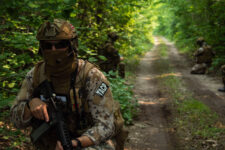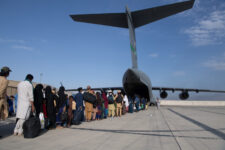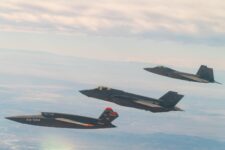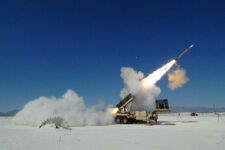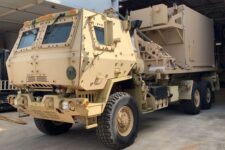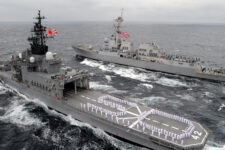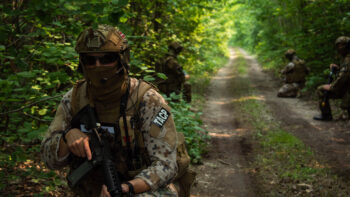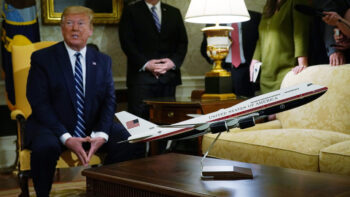It’s not often that people close to the military come out and critique current policy, especially as it is taking shape. When it happens, it is often newsworthy either because of what they say or because of who they are. Today, we offer an in-depth critique of US strategy and our evolving policies toward Syria from a professor at the Army War College, Nathan Freier which meets both criteria. He warns that the “fundamental imperfection of precision American military power” will make it very difficult to change how other governments or non-state opponents behave. “Our new dogma and its rules are at odds with those governing the real world in troubled regions like the Middle East,” he says. Read on: The Editor.
An epiphany occurs when one suddenly experiences an unexpected awakening and a new revealed truth emerges. In the Christian tradition, St. Paul experienced his epiphany on the road to Damascus. As American forces wait for the order to strike Assad’s military for using chemical weapons to kill more than 1,400 civilians, senior U.S. policymakers are about to test a new post-Iraq-Afghanistan dogma favoring state challengers and traditional military responses.
What they are destined to find if the strikes occur — their own epiphany on the road to Damascus — is the fundamental imperfection of precision American military power used as an instrument to modify behavior, especially when the behavior to be modified springs from existential motives. We will learn (or, perhaps, relearn) that our reasoning is not the same as that of many of our opponents.
Our new dogma and its rules are at odds with those governing the real world in troubled regions like the Middle East. Emerging U.S. defense convention — codified largely in the Defense Strategic Guidance (DSG) released last year— rests on three important ideas.
The first idea: focus foremost on the most obvious real or potential traditional threats, fundamentally “re-biasing” U.S. strategy in favor of rival military powers vice the wicked, complex, irregular challenges of the previous decade. An embedded assumption here is that functioning states that act irresponsibly will be more threatening to our interests than failing states and regions.
The second idea: we should confront traditional military challenges “at range” with high tempo, high-volume precision attack. Here, see rule one. If irresponsible and high-functioning militaries are the problem, then our continued dominance in precision attack is a silver bullet. An “irregular” corollary to this is: use a scalpel not a shotgun to excise terrorists.
The third and final idea is to push allies and partners to do the “dirty work,” relieving U.S. forces of the grinding face-to-face military action experienced over the last 12 years. All this assumes — in spite of a great deal of evidence to the contrary — that we will always have strong partners who demonstrate three critical characteristics — capability, will and endurance. The current trajectory of the British armed forces and their recent parliamentary vote on Syria may be an important canary in the coal mine.
The new defense rules would make perfect sense if the most compelling 21st century challenges in places like the Middle East matched prevailing assumptions and preferences. Unfortunately, reality is outpacing the Pentagon’s desired business practices. For example, there is no small irony in the fact that, in spite of our rebalance to Asia, our first post-war conflict may not be “cold war” with a traditional high-end anti-access challenger but a “hot war” against a collapsing regime and its unconventional allies.
Further, the Syrian crisis in general has a great deal more to do with that government’s devolution into violent disorder than its ability to wage traditional war. Finally, while there is probably no shortage of targets for U.S. bombs and missiles, a thorough fusillade of precision strikes against an already fragile state is likely only to hasten Syria’s inevitable collapse, opening the very real prospect of an unbroken and uncontrolled swath of civil conflict from the Mediterranean to the northern Arabian Gulf — better known as the Persian Gulf.
No one wants a return to our recent past, but DoD’s new guiding principles risk being exposed as fiction. They may brief well in the West Wing but do not stand up at all to reality.
In the end, and in spite of their very best efforts to strip U.S. strategy of anything but the most clinical and sanitary military options, U.S. national security policy will remain an unwilling captive of a “new normal” in the Middle East that promises to spread within and beyond that region. This “new normal” is headless, organic, disordered and largely uncontrollable. It springs from demographics, from generational inequity and hatred and it will continue to liberally mix — often without specific malice toward the United States — with popular disaffection, profound and prolific lethality, and explosive electronic connectivity to create ever more contagious instability. Left unchecked, it cannot help but encroach on important U.S. interests.
If the cruise missiles begin striking Syria, we will learn that unchallenged command of the air, sea, and space adjacent to or impacting important theaters of operation will provide few guarantees that all will turn out as we wish.
If we dare to reflect, we are certain to recognize that, while rival powers will brandish and employ traditional military instruments against our interests from time to time, they may be the least — or at least most controllable — of our military problems. The likeliest, most dangerous and more disruptive threats will emerge from profound failures of legal and moral authority in places where U.S. force can manage or mitigate their worst effects but cannot contribute to their decisive resolution at an acceptable cost.
Unlike St. Paul, the American epiphany on the road to Damascus will be disheartening. We will find that confronting the “new normal” according to our preferred rules will end in even more disappointment.
Nathan Freier is an associate professor of national security studies at the U.S. Army War College’s Strategic Studies Institute. The views expressed in this article the author’s and do not necessarily reflect the official policy or position of the United States Army War College, the United States Army, the Department of Defense, or the United States Government.
No service can fight on its own: JADC2 demands move from self-sufficiency to interdependency
Making all-domain operations a warfighting capability means integrating, fusing, and disseminating a sensor picture appropriate for a particular theater segment, not all of them, says the Mitchell Institute’s David Deptula.
